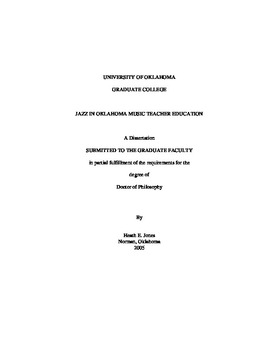| dc.contributor.advisor | Barry, Nancy H., | en_US |
| dc.contributor.author | Jones, Heath E. | en_US |
| dc.date.accessioned | 2013-08-16T12:20:00Z | |
| dc.date.available | 2013-08-16T12:20:00Z | |
| dc.date.issued | 2005 | en_US |
| dc.identifier.uri | https://hdl.handle.net/11244/957 | |
| dc.description.abstract | Oklahoma music teacher education institutions should integrate the preceding aspects of jazz study into current music education curricula. With these efforts, the role of jazz in Oklahoma music teacher education can fulfill a mission to prepare future music educators with the knowledge, skills, and experience necessary to be capable jazz educators. | en_US |
| dc.description.abstract | The purpose of this study was to investigate the role of jazz in music teacher education curricula in Oklahoma colleges and universities. The Jazz in Oklahoma Music Teacher Education Survey was used to obtain attitudes of Oklahoma music education program administrators concerning the: (a) importance of jazz in music teacher education, (b) availability of jazz study in music teacher education curricula, (c) degree of jazz activity in secondary schools and communities, (d) backgrounds of Oklahoma music education program administrators, and (e) comments on the topic of jazz in Oklahoma music teacher education. A link to the online survey was sent via email to designated music education program administrators (n=23) at the 23 colleges and universities in Oklahoma offering a music education degree. The Jazz in Oklahoma Music Teacher Education Interview Protocol was used to conduct follow-up interviews to supplement quantitative data and provide more in-depth understanding. Analysis of the data revealed the following results: (a) Several interview participants expressed insufficient undergraduate training in jazz; (b) Interview participants reported that jazz activity in Oklahoma public schools is inconsistent; (c) Survey participants rated the following 12 aspects of jazz study as "important" or "very important" for music teacher education: Jazz Ensemble, Jazz Ensemble Pedagogy, Jazz Improvisation Pedagogy, Jazz Education Philosophy, Jazz Improvisation Technique, Jazz History, Jazz in General Music, Jazz Keyboard, Jazz Arranging, Jazz Combo, Jazz Combo Pedagogy, and Jazz Vocal Technique; (d) Jazz Ensemble is available in 86% of institutions surveyed and is the only jazz course available in more than 50% of institutions; (e) The majority of survey respondents "agreed" or "strongly agreed" that music education majors should be required to take at least one course in jazz studies; (f) Interview participants reported degree hour restrictions make it impractical to include jazz courses within music teacher education curricula. | en_US |
| dc.format.extent | x, 254 leaves : | en_US |
| dc.subject | Music teachers Training of. | en_US |
| dc.subject | Education, Teacher Training. | en_US |
| dc.subject | Music Instruction and study. | en_US |
| dc.subject | Music. | en_US |
| dc.subject | Education, Music. | en_US |
| dc.title | Jazz in Oklahoma music teacher education. | en_US |
| dc.type | Thesis | en_US |
| dc.thesis.degree | Ph.D. | en_US |
| dc.thesis.degreeDiscipline | School of Music | en_US |
| dc.note | Source: Dissertation Abstracts International, Volume: 66-12, Section: A, page: 4334. | en_US |
| dc.note | Adviser: Nancy H. Barry. | en_US |
| ou.identifier | (UMI)AAI3203317 | en_US |
| ou.group | Weitzenhoffer Family College of Fine Arts::School of Music | |
